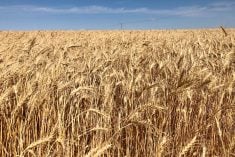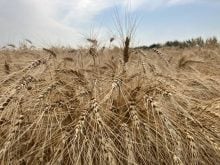MarketsFarm — Argentina has become the first country in the world to approve cultivation and consumption of a genetically modified wheat variety, the country’s National Commission for Science and Technology (CONICET) announced Thursday.
“This is the first approval in the world for drought-tolerant genetic transformation in wheat,” CONICET said in a statement.
Argentina is the world’s fourth-largest wheat exporter, and CONICET noted that the GM wheat will need to be approved in Brazil, Argentina’s largest market, before being considered commercially viable.
The drought-resistant HB4 wheat variety was developed by Bioceres, an Argentine biotech company, alongside the National University and CONICET.
Read Also

U.S. grains: Soybeans bounce as Chinese demand assessed, wheat drops
Chicago soybean prices firmed on Friday in a bargain-buying bounce after a sharp fall on Thursday, as traders assessed prospects for more U.S. sales to China after the trade war truce between the countries.
“Approval of our HB4 wheat in Argentina represents a groundbreaking milestone for the entire global value chain of this important crop, given the substantial yield increases and significant environmental benefits that our technology offers,” Bioceres CEO Federico Trucco said in a release.
“Now we must go out into the world and convince people that this is super good and be able to generate markets for this wheat, which represents an evolutionary leap.”
Trucco admitted in news reports that winning approval from Brazil, the country’s key export market, could prove difficult. “The first country we have to convince is Brazil, and it may be hard work,” he said.
Numerous world experts have also expressed concern, given the fact that GM wheat has faced stiff resistance from both local and foreign consumers in the past.
HB4 wheat varieties have undergone field trials for the past decade. The trait is already approved for use in soybeans in a number of countries, including Brazil and the United States.
During trials, HB4 seed varieties increased wheat yields by 20 per cent, on average, during growing seasons impacted by droughts, according to Bioceres data.
The company noted the GMO trait would help mitigate production losses amid increased incidences of drought as climate change worsens. HB4 also facilitates double cropping of soybeans and wheat.
The deregulatory process for HB4 wheat has already started in the U.S., Uruguay, Paraguay and Bolivia. Bioceres is also preparing presentations for Australia and Russia, as well as other countries in Asia and Africa.














